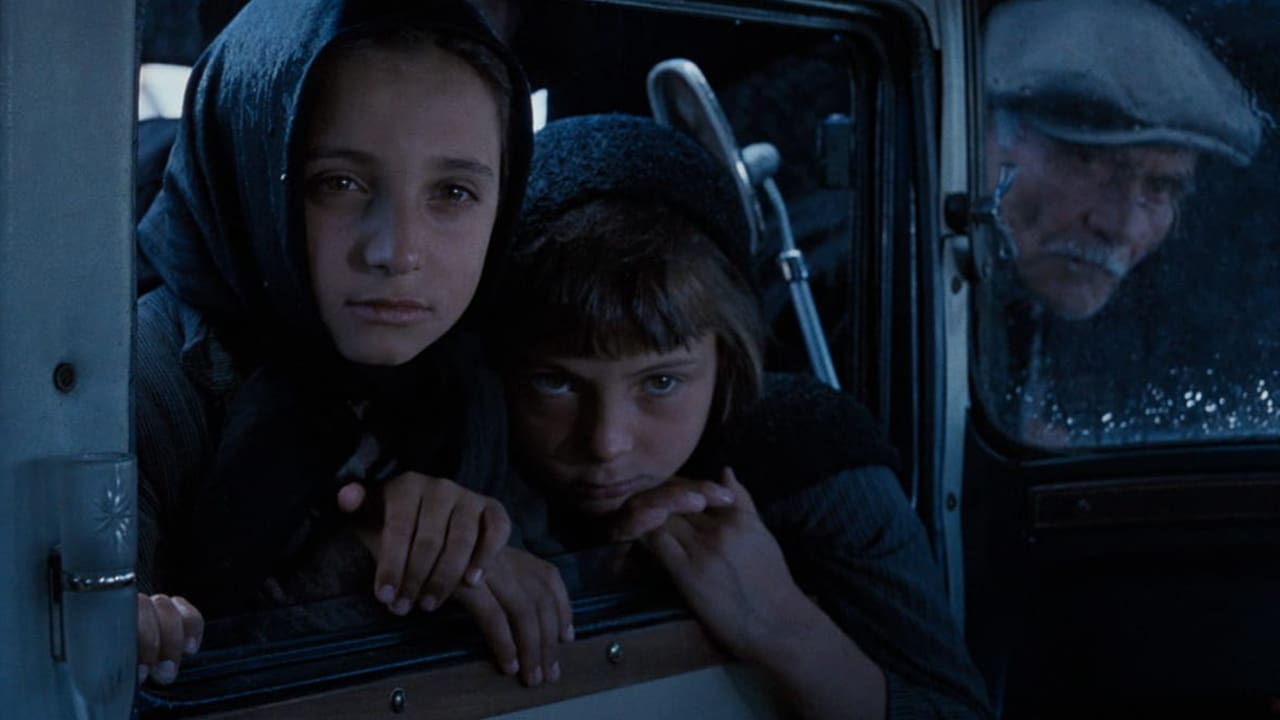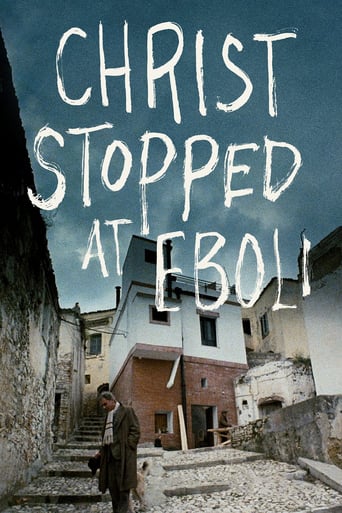

1997:Checking some videos that my dad had recently brought,I spotted a double video of a wonderfully looking film.Opening the case,I was disappointed to find that the set only contained the second Video.2014:With having spent over 10 years trying to track a DVD/video version of the title,I decided to ask a DVD seller,who to my surprise revealed that he had recently gotten hold of the film! This led to me excitingly getting ready to finally pay a visit to Eboli.The plot:Italy 1935:Speaking out against the fascist regime of Italy,painter/doctor Carlo Levi is punished by the government ,by being put on a train which takes him (and dozens of other "trouble makers") to an isolated rural village on the south side of Italy,miles away from the wheels of power based in the north of the country.Arriving in the village,Levi is greeted by Mayor Don Luigi Magalone,who politely tells Levi that he must register his name every day,and that he is not allowed to take part in any "sub verse" activities.While Levi initially finds himself longing to get back home,Levi soon finds himself becoming increasingly fascinated with the poor life style that the villagers are living,which would have been completely alien to him in the big cities.View on the film:Adapting Carlo Levi's (who would end up unsuccessfully running for the Senate as an independent communist in the 1963 elections)autobiography over a 200 minute running time (good to see they kept things short & sweet!) the screenplay by writer/ (along with Tonino Guerra and Raffaele La Capria)director Francesco Rosi disappointingly never fully expresses the passage of time that the movie attempts to cover,with the progression of Levi's relationship with the villages being one which progresses in sudden bursts,rather than a more gradual,natural pace.Separating the 200 minutes as 4 TV episodes,the writers go into a superb amount of detail into the daily struggle that people in the south of Italy face,with every change in tax and the withdrawal of doctors that the government makes turning the village into a waste land which is on a completely different planet to the mighty Rome.Creating a mysterious atmosphere,Rosi and cinematographer Pasqualino De Santis brilliantly use over-saturated colours to display the almost otherworldly landscape that Levi finds himself surrounded by,which is revealed in expertly handled wide-shots.As Levi starts to become friends with the village residences,Rosi heats up the colours into warm blues & yellows which show the warmth that has built up between Levi and the towns people.Stealing every scene that he's in, Paolo Bonacelli gives a tremendous performance as fascist mayor Don Luigi Magalone,with Bonacelli giving Magalone a bumbling kick as he finds himself getting out smarted in every direction by Levi.Perfectly expressing Levi's initial uncomfortable feelings over stepping out of his comfort zone, Gian Maria Volonté gives a striking,subtle performance as Levi,with Gian Maria Volonté injecting Levi's voice with a real sense of gravitas,as he finds himself getting deeply involved with a community,from what was previously an unknown land.
... View Morethis movie did more than any other Italian film i've seen to interest me in italy itself--the people, the land, the culture. it also opened my mind to the intelligence of the uneducated among us--i loved that guilia was so real and right-n and so full of peasant superstition that in no way interfered with her ability to "get it." i have begun to travel in italy and having seen this film i am driven to see the south and visit the carlo levi house and museum. his paintings see into the object, to me, like a quality black and white study which i find the most expressive medium. as soon as i see the faces in the beginning of this film, i am drawn in. i found the melancholy music somewhat sentimental (like the music in truffaut's films) but a necessary comfort.
... View MoreCarlo Levi, an Italian who fought against the arrival of Fascism in his native Torino, was arrested for his activities and sent to exile in the Lucania region of the country, now known as Basilicata. The hill town of Gagliano was to be his home for the time he had to serve. This was the Italy of the 1930s where the rise of Mussolini and his quest for conquering Ethiopia, an ill conceived idea from the start.We watch as Dr. Levi arrives at the Eboli station, where he must change to a local train and a taxi in order to reach the hill town, which was also the home of other political prisoners. Right after Levi descends from his train at Eboli, he sees Barone, a dog that has been abandoned and who will become his companion in exile. His arrival in Gagliano causes curiosity among the local folk, who see in him a cultured man who sticks out. Carlo Levi observes the people as he takes his daily walks. He can't help but notice how backward everyone seems to him. At the same time, he gets to appreciate them because even if they are ignorant of the outside world, they are genuine.Levi, who had training as a physician, receives a visit from his sister Luisa, a doctor herself. He comments on the primitive state of medicine in the town, a place that boasts two doctors, who are ineffective and set in their ways. Levi clashes with the mayor, a man who is a devout follower of Mussolini and his movement, because the way he wants to censor his communication with friends. After he receives his release, Levi is not prepared for the way he made his presence felt among the locals who come to see him off.Francesco Rosi, who adapted Carlo Levi's novel, is a director with a strong sense of political awareness. He presents the figure of Carlo Levi as a noble man who was helpless against what he wanted to do for the people of Gagliano, but the local government was not exactly enthusiastic about his meddling in the local affairs. Where he is able to connect with the populace is with his knowledge of medicine. Carlo Levi also painted the people of the region.Gian Maria Volonte was an actor of quiet intensity. He is in almost all the scenes and he expresses a rage with his eyes. Mr. Volonte was the main reason for watching the film. Since he had collaborated with Rosi before, it seemed logical he would portray Carlo Levi in the movies, something that he does with ease and elegance. Others in the film include Lea Massari, as Luisa, Irene Papas as Giuglia, Alain Cluny as the Barone Nicola Rotondo. A favorable impression is made by Paolo Bonacelli, who appears as the mayor Luigi Magalone, who even when censoring Levi showed a lot of respect for him.The actual filming was done in Aliano, an ancient hill town, where the real Carlo Levi went to live after the war. Pasqualino DeSantis, the cinematographer, captured in vivid images the picturesque town, the countryside and the people of this lost city. Francesco Rosi made an interesting film about a man of principle that will live forever.
... View MoreChrist Stopped at Eboli is one of the best movies by Rossi, loyal to his tradition of neorealism. The movie depicts isolated rural-peasant life as an account of an urban intellectual doctor, painter and a political activist who has been exiled to this remote area due to his political dissent during the Fascist rule in Italy. Not like similar movies in lenght, Crist Stopped at Eboli constantly absorbs audience, probably due to its realist description and selective representation of peasant life which is "frozen in time". The film pushes the audience to contemplate on philosophical aspects of the concept of time and it is heavily imbued with the display of social and political problems.Rosi beautifully describes the destitute of the peasant settlers of this remote and isolated land, their ignorance and apolitical life, the deep rift between these people and state, and the irrelevance of the quasi-comic "victories" of the Il Duce to these people among many other social and political issues. Like Rosi's other movies here again neorealist representation goes along with the combination of documentary techniques and fictional context. Rosi lets the images to speak for themselves rather than the Gian Maria Volente who is in the central role in the movie.In the movie (as it is in the book), the peasant life and urbanity are represented as two alien civilizations and antithesis of each other. These peasants have their own way of life, own customs, own aspirations and means of joy. What is going on Rome or the war in Abyssinia for "regaining the glory of the Rome" does not capture their interest. They are aware of the state through the taxes collected or men called for military service. In his letter, Levi describes the urban civilization as an antithesis of this peasant life which aspired throughout the history to "colonize" it.The Christ Stopped at Eboli also pushes the audience to ponder on the philosophical meaning of history, its relevance nature and meaning. It describes this peasant life as "frozen in history", cut from outside life and lacking the understanding of time that we have. History as we understand is the history of "urban civilization". As peasants are alien to this civilization they are alien to this concept of time as well. In the village you stop counting days, hours as they become more and more irrelevant, there you return and base your life on the natural cycle of life which is based on seasons. In this sense the movie challenges our notion of history which is the history of the "city".In this sense Christ Stopped at Eboli is very analogous to Y. K. Karaosmanoğlu's Yaban. Yaban is also the story of a Turkish intellectual war veteran who abandons amenities of Istanbul for the Central Anatolian village with the hope of finding his roots and alleviating the torments of his memoirs. However, to his disappointment he finds himself in an alien peasant "civilization" where he can not communicate to those people, can not be similar to them and can not understand their aspirations. What makes Yaban and Christ stopped at Eboli similar is their approach to dichotomous nature of human civilization and the concept of time. In both novels there is a representation of antagonist peasant and urban civilizations, and a relative concept of time. In both novels there is description of life which is "frozen in time" and alien to urbanity. Indeed the study of Yaban from this perspective can be insightful for the discussions of continuity and change in the History of Mediterranean, as Turkey is widely excluded from such studies. However when you read Christ stopped at Eboli and Yaban what strikes you first is the patterns of similarity in peasant life and experience of the intellectuals visiting these places. They can back both the universality of "two civilizations" argument and lounge duree approach in the Mediterranean area.
... View More